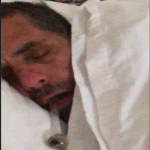What are the bigtime sleep medicine accreditations for MDs?
- Suddenly Worn Out
- Posts: 353
- Joined: Wed May 02, 2012 11:41 pm
What are the bigtime sleep medicine accreditations for MDs?
What are the "bigtime" sleep medicine accreditations for Medical Doctors? In the USA? I used to know them but cant remember. I am reviewing my sleep medicine specialists credentials and want to be sure they are properly credentialed, meaning, really well trained in SLEEP APNEA and SLEEP MEDICINE. And not just in their original specialty of pulmonary medicine, neurology, psychiatry or whatever.
Thanks,
Eric
Thanks,
Eric
_________________
| Mask: Mirage Quattro™ Full Face CPAP Mask with Headgear |
| Humidifier: S9™ Series H5i™ Heated Humidifier with Climate Control |
| Additional Comments: Also own a PR System One APAP with humidifier and a Resmed S9 APAP with H5i humidifier |
- Drowsy Dancer
- Posts: 1271
- Joined: Mon Feb 28, 2011 9:35 am
- Location: here
Re: What are the bigtime sleep medicine accreditations for MDs?
_________________
| Machine: PR System One REMStar 60 Series Auto CPAP Machine |
| Mask: Swift™ FX Bella Nasal Pillow CPAP Mask with Headgears |
| Additional Comments: Software: SleepyHead. Pressure: APAP 9.5 min/11 max, A-Flex x2 |
How we squander our hours of pain. -- Rilke
-
johnthomasmacdonald
- Posts: 977
- Joined: Sun Sep 02, 2012 1:48 pm
- Location: northwest new jersey and Boston Mass
Re: What are the bigtime sleep medicine accreditations for MDs?
Any MD is legally allowed to do anything - board certification is NOT required. In theory, a GP can do brain surgery. In reality getting board certified involves doing a residency ( several years depending on the speciality) and then passing a certification exam.
_________________
| Mask: Mirage Quattro™ Full Face CPAP Mask with Headgear |
| Additional Comments: Resmed ASV adapt enhanced - epap=8; minPS=3; maxPS=17 ave. pressure =10 |
- greatunclebill
- Posts: 1503
- Joined: Mon Feb 20, 2012 7:48 pm
- Location: L.A. (lower alabama)
Re: What are the bigtime sleep medicine accreditations for MDs?
bad link. goes to an end user agreement.
_________________
| Mask: Quattro™ FX Full Face CPAP Mask with Headgear |
| Additional Comments: myAir, OSCAR. cms-50D+. airsense 10 auto & (2009) remstar plus m series backups |
First diagnosed 1990
please don't ask me to try nasal. i'm a full face person.
the avatar is Rocco, my Lhasa Apso. Number one "Bama fan. 18 championships and counting.
Life member VFW Post 4328 Alabama
MSgt USAF (E-7) medic Retired 1968-1990
please don't ask me to try nasal. i'm a full face person.
the avatar is Rocco, my Lhasa Apso. Number one "Bama fan. 18 championships and counting.
Life member VFW Post 4328 Alabama
MSgt USAF (E-7) medic Retired 1968-1990
- Drowsy Dancer
- Posts: 1271
- Joined: Mon Feb 28, 2011 9:35 am
- Location: here
Re: What are the bigtime sleep medicine accreditations for MDs?
Click on "agree" and you get to the content at the link.greatunclebill wrote:bad link. goes to an end user agreement.
_________________
| Machine: PR System One REMStar 60 Series Auto CPAP Machine |
| Mask: Swift™ FX Bella Nasal Pillow CPAP Mask with Headgears |
| Additional Comments: Software: SleepyHead. Pressure: APAP 9.5 min/11 max, A-Flex x2 |
How we squander our hours of pain. -- Rilke
Re: What are the bigtime sleep medicine accreditations for MDs?
Finishing High School for some of them! Jim
Retired Fortune Teller, or the person at the carny that guesses weight!
Ex-Casino operator! (Used to the high profits)
Retired Fortune Teller, or the person at the carny that guesses weight!
Ex-Casino operator! (Used to the high profits)
Use data to optimize your xPAP treatment!
"The art of medicine consists in amusing the patient while nature cures the disease." Voltaire
"The art of medicine consists in amusing the patient while nature cures the disease." Voltaire
- chunkyfrog
- Posts: 34544
- Joined: Mon Jul 12, 2010 5:10 pm
- Location: Nowhere special--this year in particular.
Re: What are the bigtime sleep medicine accreditations for MDs?
Released the fee from paypal account and checked English as the language to be printed on the "sertificate"
_________________
| Mask: AirFit™ P10 For Her Nasal Pillow CPAP Mask with Headgear |
| Additional Comments: Airsense 10 Autoset for Her |
- Suddenly Worn Out
- Posts: 353
- Joined: Wed May 02, 2012 11:41 pm
Re: What are the bigtime sleep medicine accreditations for MDs?
LOL Yeah I am aware doctors have a lot of leeway. Although it is not true any MD can practice in any place in medicine and get away with it. There are certain board certifications and other certs MDs can get and do get if they want to specialize or sub-specialize in sleep medicine. I used to know them, but forgot so I came here to ask what those accreditations/certifications are.johnthomasmacdonald wrote:Any MD is legally allowed to do anything - board certification is NOT required. In theory, a GP can do brain surgery. In reality getting board certified involves doing a residency ( several years depending on the speciality) and then passing a certification exam.
<shaking head, holding head>
Eric
_________________
| Mask: Mirage Quattro™ Full Face CPAP Mask with Headgear |
| Humidifier: S9™ Series H5i™ Heated Humidifier with Climate Control |
| Additional Comments: Also own a PR System One APAP with humidifier and a Resmed S9 APAP with H5i humidifier |
- DreamStalker
- Posts: 7509
- Joined: Mon Aug 07, 2006 9:58 am
- Location: Nowhere & Everywhere At Once
Re: What are the bigtime sleep medicine accreditations for MDs?
Doesn't matter ... they are all certified to worship the religion of money.
How's the ice cream?Hospitals Profit From Surgical Errors, Study Finds
By DENISE GRADY
Published: April 16, 2013
Hospitals make money from their own mistakes because insurers pay them for the longer stays and extra care that patients need to treat surgical complications that could have been prevented, a new study finds.
Changing the payment system, to stop rewarding poor care, may help to bring down surgical complication rates, the researchers say. If the system does not change, hospitals have little incentive to improve: in fact, some will wind up losing money if they take better care of patients.
The study and an editorial were published Tuesday in The Journal of the American Medical Association. The study authors are from the Boston Consulting Group, Harvard’s schools of medicine and public health, and Texas Health Resources, a large nonprofit hospital system.
The study is based on a detailed analysis of the records of 34,256 people who had surgery in 2010 at one of 12 hospitals run by Texas Health Resources. Of those patients, 1,820 had one or more complications that could have been prevented, like blood clots, pneumonia or infected incisions.
The median length of stay for those patients quadrupled to 14 days, and hospital revenue averaged $30,500 more than for patients without complications ($49,400 versus $18,900). Private insurers paid far more for complications than did Medicare or Medicaid, or patients who paid out of pocket.
The authors said in an interview that they were not suggesting that hospitals were trying to make money by deliberately causing complications or refusing to address the problem.
“Absolutely not,” said David Sadoff, a managing director of the Boston Consulting Group. “We don’t believe that is happening at all.”
But, he said, the current payment system makes it difficult for hospitals to perform better because improvements can wind up costing them money.
Susan Pisano, a spokeswoman for America’s Health Insurance Plans, a trade group for insurance companies, said in an interview that the study illustrated that the entire health care system needed to move away from what she called “the perverse incentives of the old fee-for-service system that emphasized quantity over quality, and toward methods of payment that reward better care.”
The researchers say that to help reduce complications, insurers not only should quit paying for substandard care, but also should reward excellent care with bonuses. In addition, hospitals should be required to disclose their complication rates, because patients will shun those with high rates and force those hospitals to improve or shut down.
Dr. Barry Rosenberg, an author and a managing director of Boston Consulting, said the study came about because his firm was working with Texas Health Resources to find ways to reduce its hospitals’ surgical complication rates, which, at 5.3 percent, were in line with those reported by similar hospitals. Part of that work involved analyzing the costs, and he said the team was stunned to realize that lowering the complication rates would actually cost the hospital money.
“We said, ‘Whoa, we’re working our tails off trying to lower complications, and the prize we’re going to get is a reduction in profits,’ ” Dr. Rosenberg said in an interview.
The authors focused on one particular figure, called the contribution margin, which is an important measure of a hospital’s income and ability to cover its costs. They said that when complications occurred, this measure tripled for patients with private insurance and doubled for those on Medicare.
Dr. Mark C. Lester, a study author and the executive vice president of Texas Health Resources, said its hospitals had begun to use a checklist system to help prevent complications. Dr. Atul A. Gawande, a Harvard surgeon who is a pioneer in using checklists and who took part in the Texas study, helped develop the system. Surgical checklists involve deceptively simple-sounding practices like double-checking the patient’s identification and what part of the body is being operated on, and making sure that drug allergies have been noted and proper medications given.
Dr. Lester said it was not clear how low the complication rate could or should go. Zero would be great, but was not realistic, he said.
As to whether the hospital would lose money if more patients needed less care and went home sooner after surgery, Dr. Lester said, “to us that doesn’t have an impact.”
“Reducing complications and increasing safety is why we’re there,” he said. “If in doing that, some payments don’t come our way, it’s not of consequence. What’s of consequence is that people who come to us are in a safer environment.”
Dr. Robert M. Wachter, an expert on medical errors who was not involved in the study, said in an e-mail that Medicare and other payers had tried to encourage better care by refusing to pay for certain kinds of medical errors and cutting reimbursement if too many patients were readmitted or gave the hospital bad marks on patient-satisfaction surveys. But the new study “shows that we still have miles to go,” said Dr. Wachter, the associate chairman of the department of medicine at the University of California, San Francisco.
Ms. Pisano, of the health insurance group, said Medicare and private insurers were already using a “never list” of things they will not pay for, like leaving a sponge or instrument inside a patient, or operating on the wrong organ or wrong limb.
In an editorial, Uwe E. Reinhardt, an expert on medical economics from Princeton University, called the study’s findings “troublesome but not surprising.” He called the current payment system “untoward,” adding that it “can tempt otherwise admirable people into dubious conduct.”
http://www.nytimes.com/2013/04/17/healt ... .html?_r=0
President-pretender, J. Biden, said "the DNC has built the largest voter fraud organization in US history". Too bad they didn’t build the smartest voter fraud organization and got caught.













